These Carl Jung quotes will make you want to look into yourself and help you figure out what you really want in life.
As one of the most compelling and famous figures in psychology, his quest for knowledge knew no bounds.
We’ve collected 160 of our favorite quotes that talk about growth, acceptance, purpose, and religion.
Let’s explore the mind of the father of analytical psychology together.
Start reading the full collection here.
And don’t forget to check out these Brene Brown quotes.
Best Carl Jung Quotes
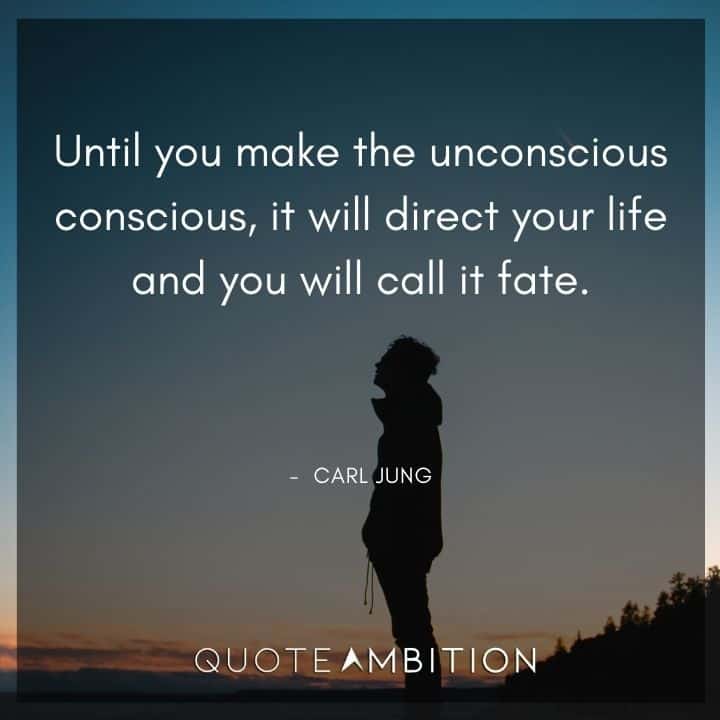
1. “Until you make the unconscious conscious, it will direct your life and you will call it fate.”
2. “The meeting of two personalities is like the contact of two chemical substances—if there is any reaction, both are transformed.”
3. “People will do anything, no matter how absurd, to avoid facing their own souls.”
4. “Every form of addiction is bad, no matter whether the narcotic be alcohol, morphine, or idealism.”
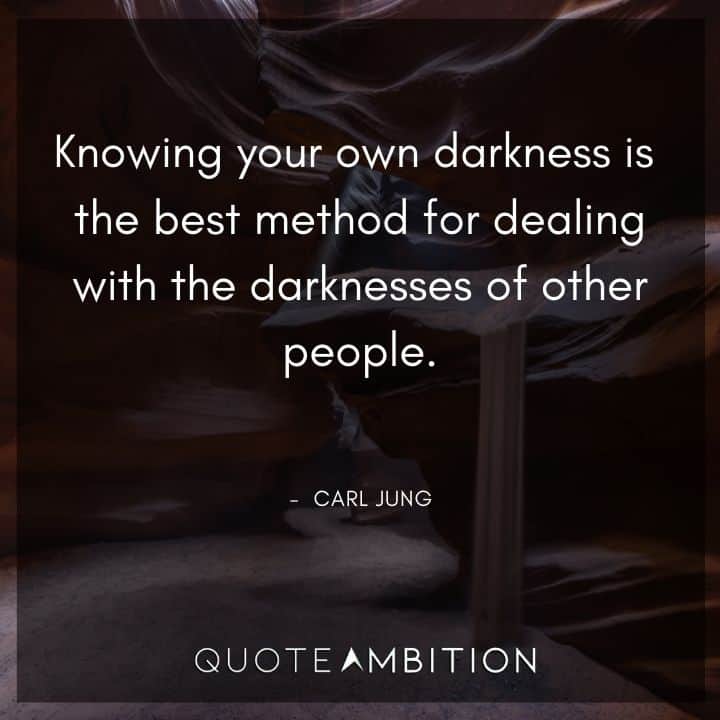
5. “Knowing your own darkness is the best method for dealing with the darknesses of other people.”
6. “Show me a sane man and I will cure him for you.”
7. “Loneliness does not come from having no people about one, but from being unable to communicate the things that seem important to oneself, or from holding certain views which others find inadmissible.”
8. “I am not what happened to me, I am what I choose to become.”
9. “Your visions will become clear only when you can look into your own heart.”
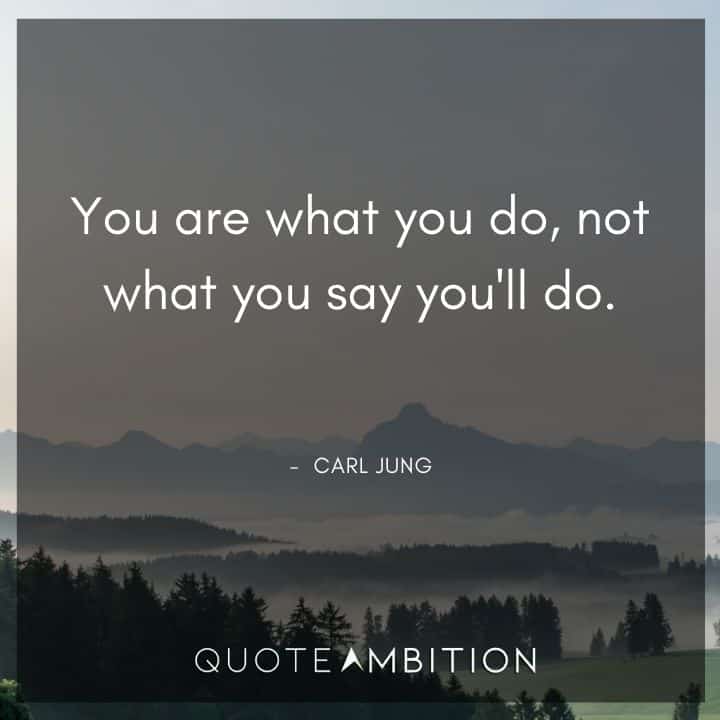
10. “You are what you do, not what you say you’ll do.”
11. “The most terrifying thing is to accept oneself completely.”
12. “The privilege of a lifetime is to become who you truly are.”
13. “Everything that irritates us about others can lead us to an understanding of ourselves.”
14. “One does not become enlightened by imagining figures of light, but by making the darkness conscious.”
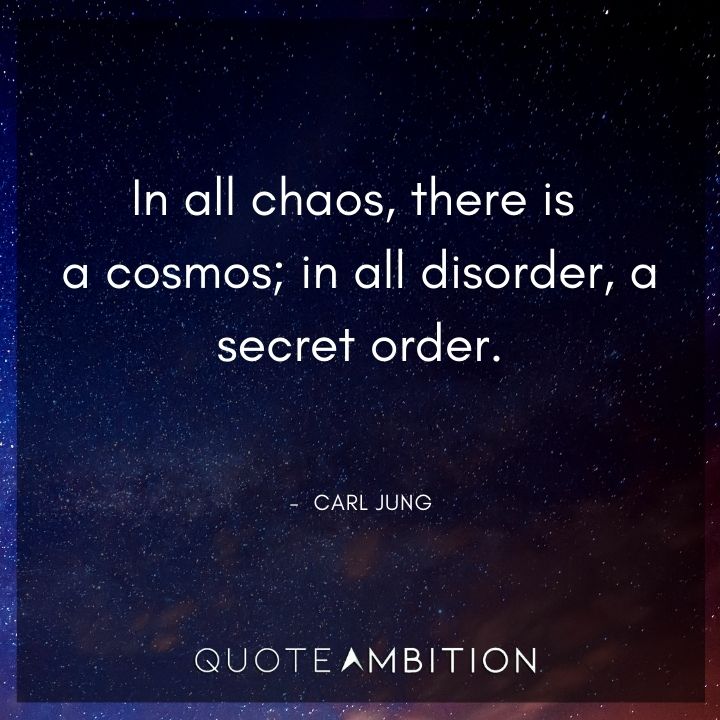
15. “In all chaos, there is a cosmos; in all disorder, a secret order.”
16. “As a child, I felt myself to be alone and I am still, because I know things and must hint at things which others apparently know nothing of, and for the most part do not want to know.”
17. “The pendulum of the mind oscillates between sense and nonsense, not between right and wrong.”
18. “There’s no coming to consciousness without pain.”
19. “Where your fear is, there is your task.”
Related: Neville Goddard Quotes
Carl Jung Quotes on Growth and Self-Improvement
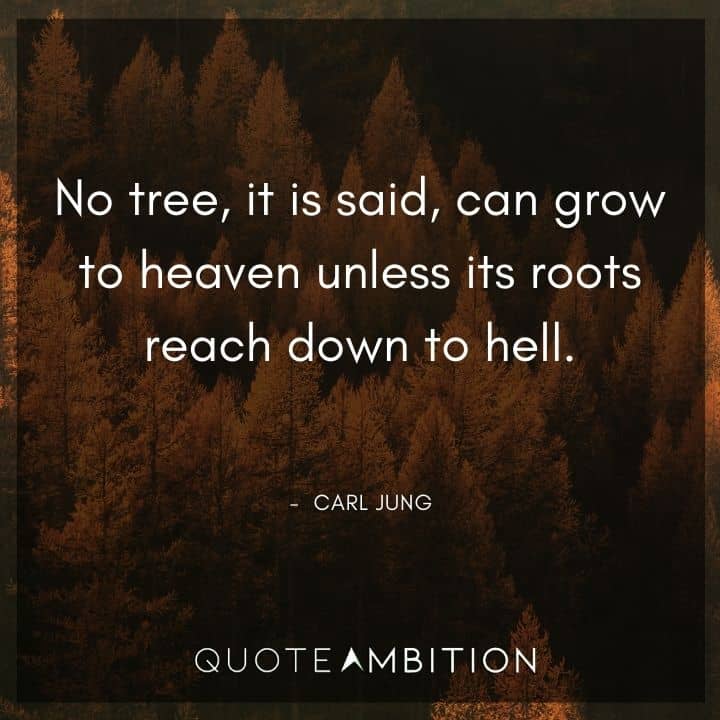
20. “No tree, it is said, can grow to heaven unless its roots reach down to hell.”
21. “Mistakes are, after all, the foundations of truth; and if a man does not know what a thing is, it is at least an increase in knowledge if he knows what it is not.”
22. “The greatest tragedy of the family is the unlived lives of the parents.”
23. “Madness is not to be despised and not to be feared, but instead, you should give it life.”
24. “The shoe that fits one person pinches another; there is no recipe for living that suits all cases.”
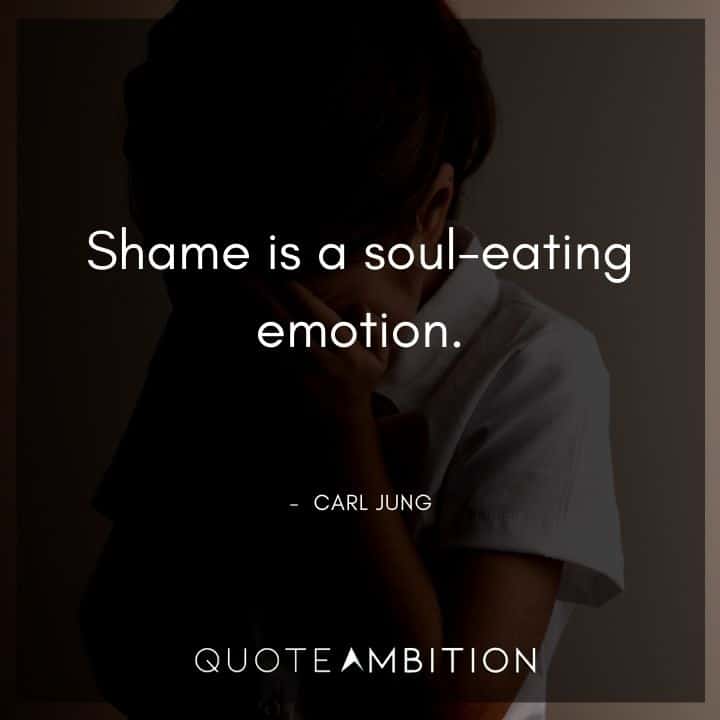
25. “Shame is a soul-eating emotion.”
26. “The creation of something new is not accomplished by the intellect, but by the play instinct acting from inner necessity. The creative mind plays with the objects it loves.”
27. “An understanding heart is everything in a teacher, and cannot be esteemed highly enough.”
28. “The reason for evil in the world is that people are not able to tell their stories.”
29. “If there is anything that we wish to change in the child, we should first examine it and see whether it is not something that could better be changed in ourselves.”
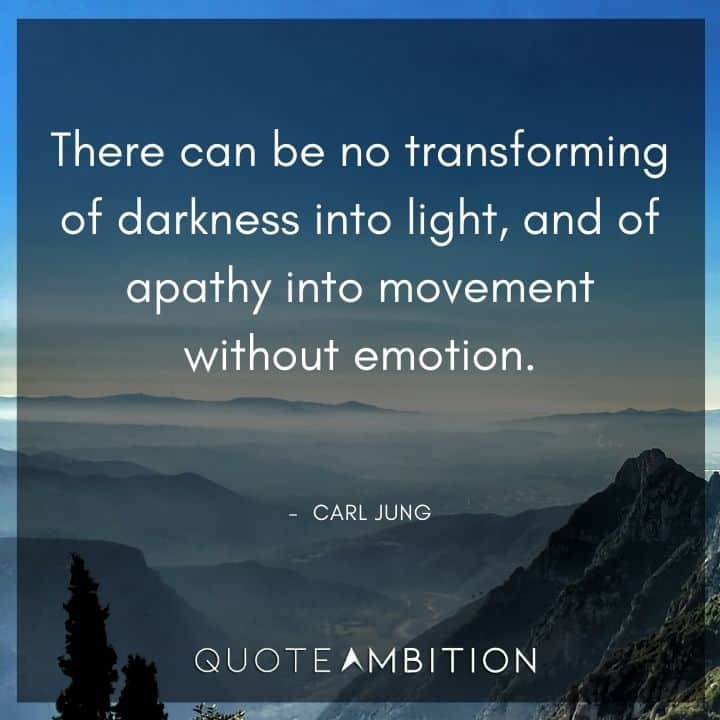
30. “There can be no transforming of darkness into light, and of apathy into movement without emotion.”
31. “The more a man lays stress on false possessions, and the less sensitivity he has for what is essential, the less satisfying is his life. He feels limited because he has limited aims, and the result is envy and jealousy.”
32. “If we understand and feel that here, in this life, we already have a link with the infinite, desires and attitudes change.”
33. “The healthy man does not torture others. Generally, it is the tortured who turn into torturers.”
34. “Every mother contains her daughter in herself, and every daughter, her mother; and every mother extends backwards into her mother, and forwards into her daughter.”
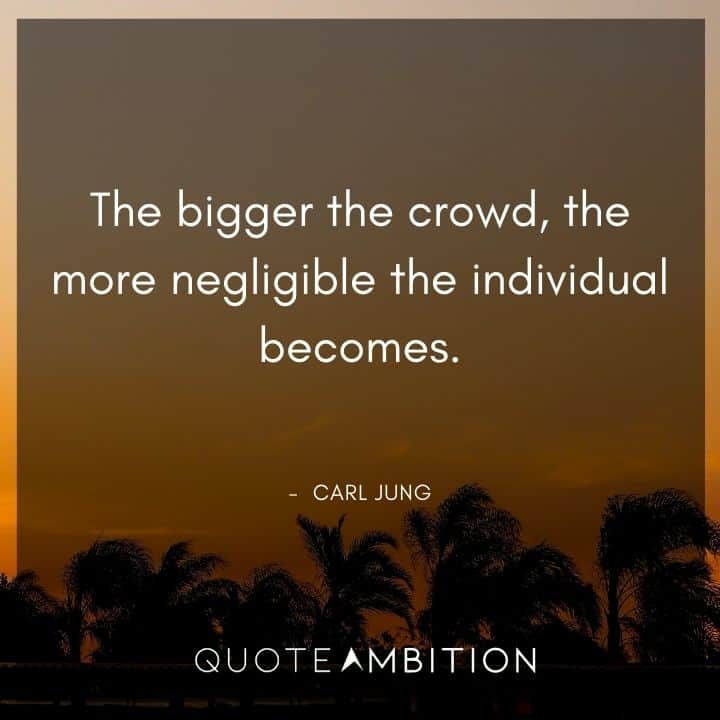
35. “The bigger the crowd, the more negligible the individual becomes.”
36. “The true leader is always led.”
37. “The less we understand of what our forebears sought, the less we understand ourselves. And thus, we help with all our might to rob the individual of his roots and his guiding instincts, so that he becomes a particle in the mass, ruled only by what Neitzsche called, ‘the spirit of gravity.’”
38. “A man who has not passed through the inferno of his passions has never overcome them.”
39. “Everything is mediated through the mind—translated, filtered, allegorized, twisted, even falsified by it. We are enveloped in a cloud of changing and endlessly shifting images.”
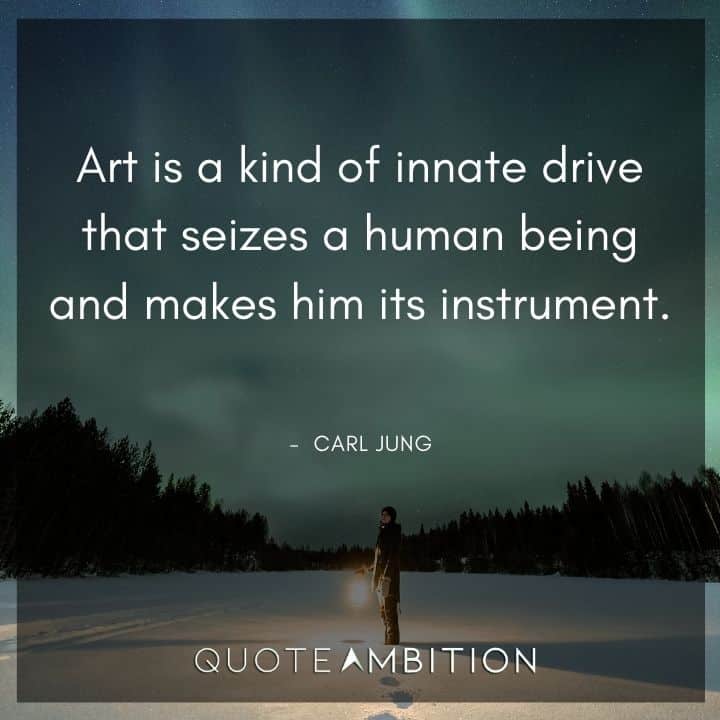
40. “Art is a kind of innate drive that seizes a human being and makes him its instrument.”
41. “It all depends on how we look at things, and not how they are in themselves.”
42. “Let us thank the life I have lived for all the happy and all the sad hours, for every joy, for every sadness. My soul, my journey, should continue with you. I will wander with you and ascend to my solitude.”
43. “Somewhere, right at the bottom of one’s own being, one generally does know where one should go and what one should do. But there are times when the clown we call ‘I’ behaves in such a distracting fashion that the inner voice cannot make its presence felt.”
44. “Nobody can fall so low unless he has a great depth.”
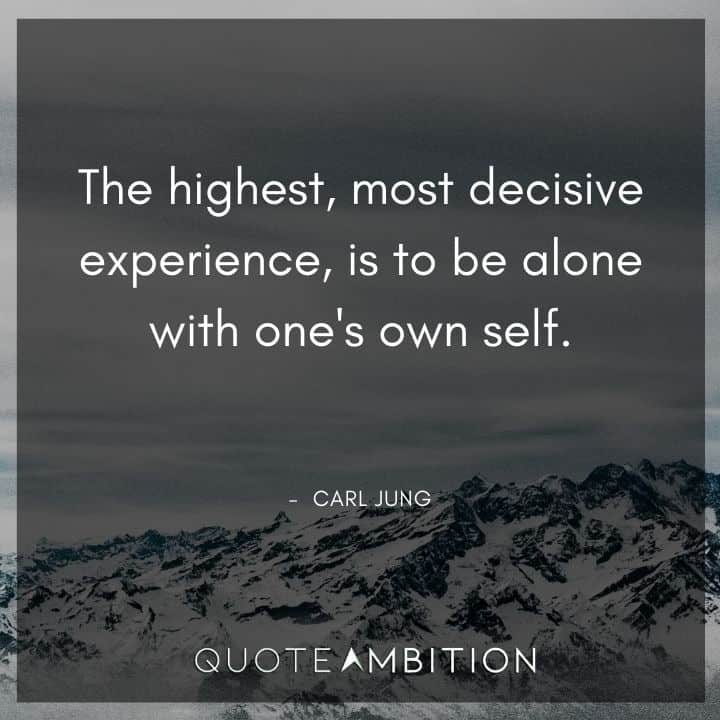
45. “The highest, most decisive experience, is to be alone with one’s own self.”
46. “You must be alone to find out what supports you. When you find that, you cannot support yourself. Only this experience can give you an indestructible foundation.”
47. “I am looking forward enormously to getting back to the sea again, where the overstimulated psyche can recover in the presence of that infinite peace and spaciousness.”
48. “Faith, hope, love, and insight are the highest achievements of human effort. They are found, given by experience.”
49. “Psychological or spiritual development always require a greater capacity for anxiety and ambiguity.”
Related: Jordan Peterson Quotes
Carl Jung Quotes on Purpose and Giving Meaning to Life
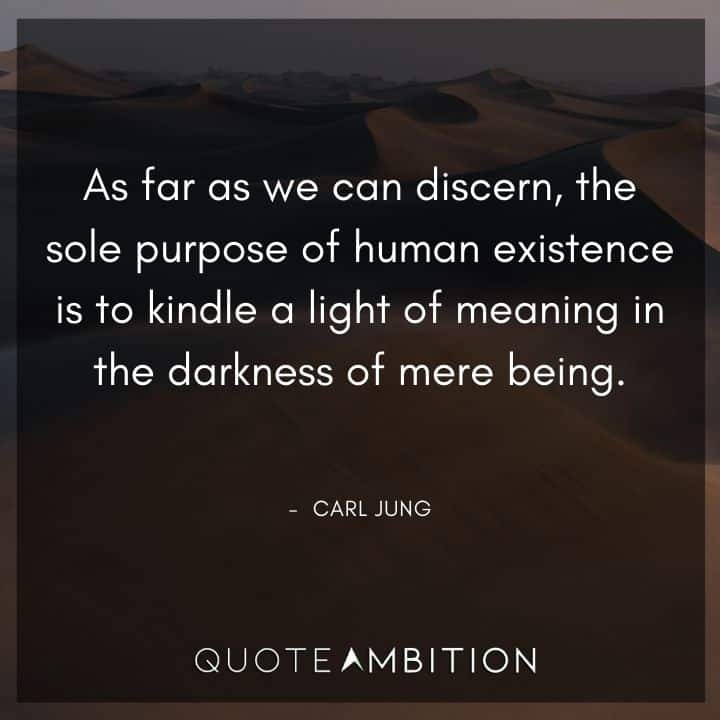
50. “As far as we can discern, the sole purpose of human existence is to kindle a light of meaning in the darkness of mere being.”
51. “Whatever is rejected from the self, appears in the world as an event.”
52. “How can I be substantial if I do not cast a shadow? I must have a dark side also If I am to be whole.”
53. “Where love rules, there is no will to power; and where power predominates, love is lacking. The one is the shadow of the other.”
54. “Life itself has no rules—that is its mystery and its unknown law. What you call knowledge is an attempt to impose something comprehensible on life.”
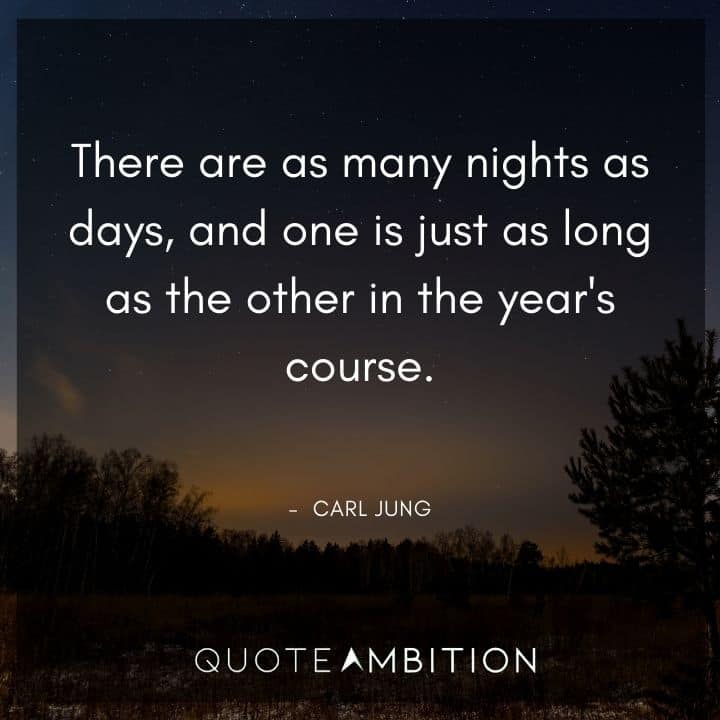
55. “There are as many nights as days, and one is just as long as the other in the year’s course.”
56. “About a third of my cases are suffering from no clinically definable neurosis, but from the senselessness and emptiness of their lives. This can be defined as the general neurosis of our times.”
57. “Wholeness is not achieved by cutting off a portion of one’s being, but by integration of the contraries.”
58. “It is often tragic to see how blatantly a man bungles his own life and the lives of others yet remains totally incapable of seeing how much the whole tragedy originates in himself, and how he continually feeds it and keeps it going.”
59. “Every human life contains a potential. If that potential is not fulfilled, then that life was wasted.”
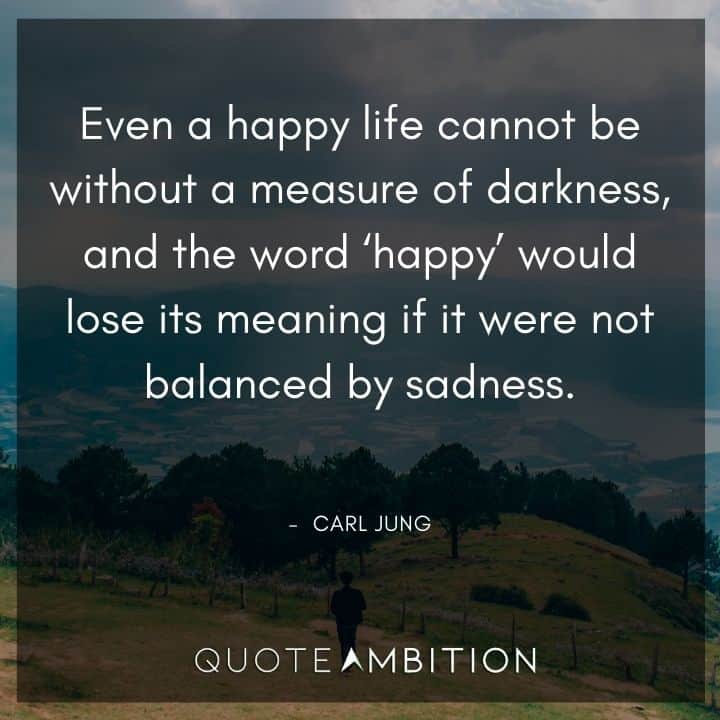
60. “Even a happy life cannot be without a measure of darkness, and the word ‘happy’ would lose its meaning if it were not balanced by sadness.”
61. “We cannot live the afternoon of life according to the program of life’s morning, for what was great in the morning will be little at evening, and what in the morning was true, at evening will have become a lie.”
62. “We meet ourselves time and again in a thousand disguises on the path of life.”
63. “Only if we know that the thing which truly matters is the infinite can we avoid fixing our interests upon futilities, and upon all kinds of goals which are not of real importance.”
64. “Sometimes, you have to do something unforgivable just to be able to go on living.”
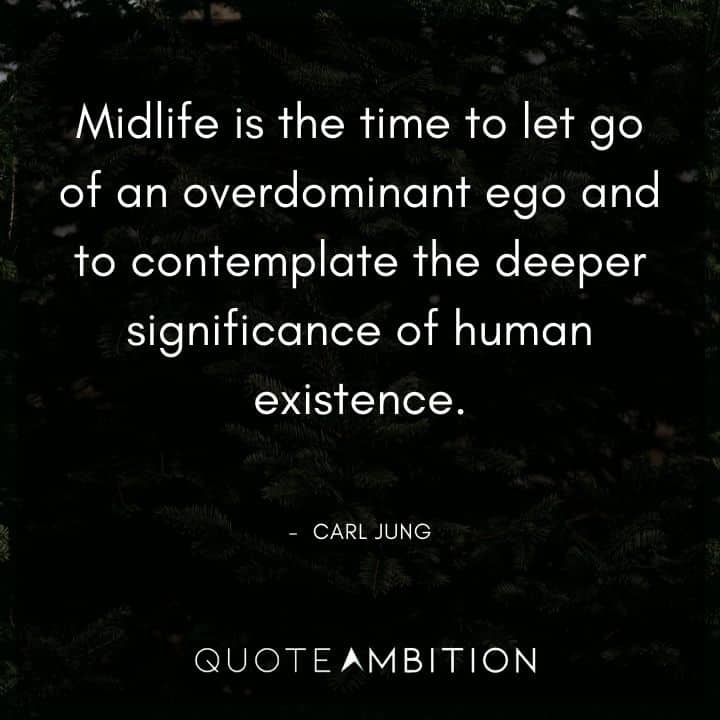
65. “Midlife is the time to let go of an overdominant ego and to contemplate the deeper significance of human existence.”
66. “My whole being was seeking for something still unknown which might confer meaning upon the banality of life.”
67. “We no longer live on what we have, but on promises; no longer in the present day, but in the darkness of the future, which we expect will at last bring the proper sunrise.”
69. “If the path before you is clear, you’re probably on someone else’s.”
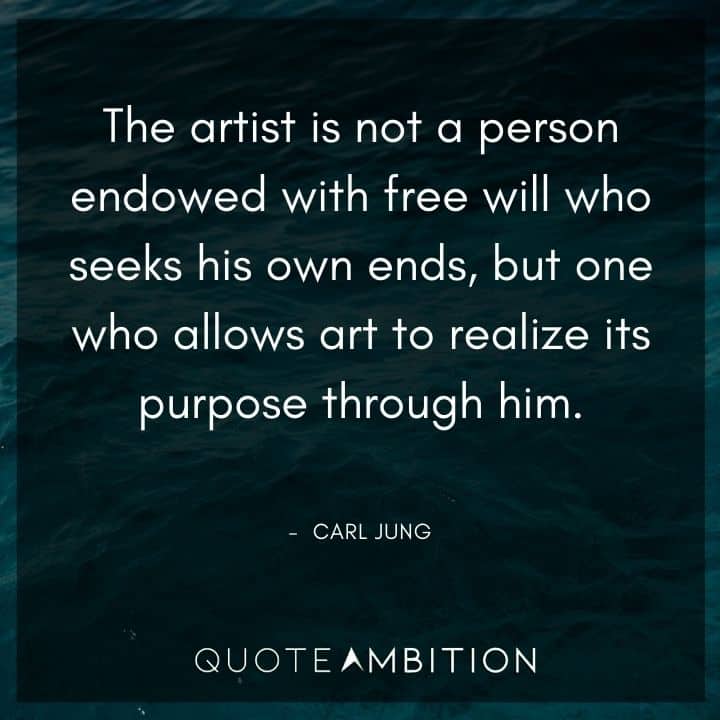
70. “The artist is not a person endowed with free will who seeks his own ends, but one who allows art to realize its purpose through him.”
71. “The only meaningful life is a life that strives for the individual realization—absolute and unconditional—of its own particular law.”
72. “To the extent that a man is untrue to the law of his being, he has failed to realize his own life’s meaning.”
73. “One thing you must know—the one thing I have learned is that one must live this life.”
74. “The sight of a child will arouse certain longings in adult, civilized persons—longings which relate to the unfulfilled desires and needs of those parts of the personality which have been blotted out of the total picture in favor of the adapted persona.”
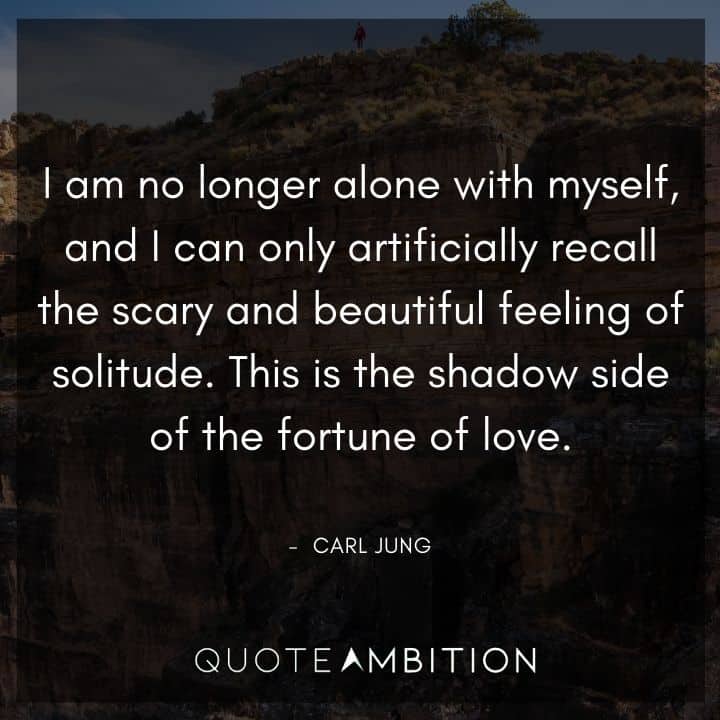
75. “I am no longer alone with myself, and I can only artificially recall the scary and beautiful feeling of solitude. This is the shadow side of the fortune of love.”
76. “I don’t aspire to be a good man. I aspire to be a whole man.”
77. “Often, the hands will solve a mystery that the intellect has struggled with in vain.”
78. “The wrong we have done, thought, or intended will wreak its vengeance on our souls.”
79. “Whenever we give up, leave behind, and forget too much, there is always the danger that the things we have neglected will return with added force.”
Carl Jung Quotes on Wisdom and Knowledge
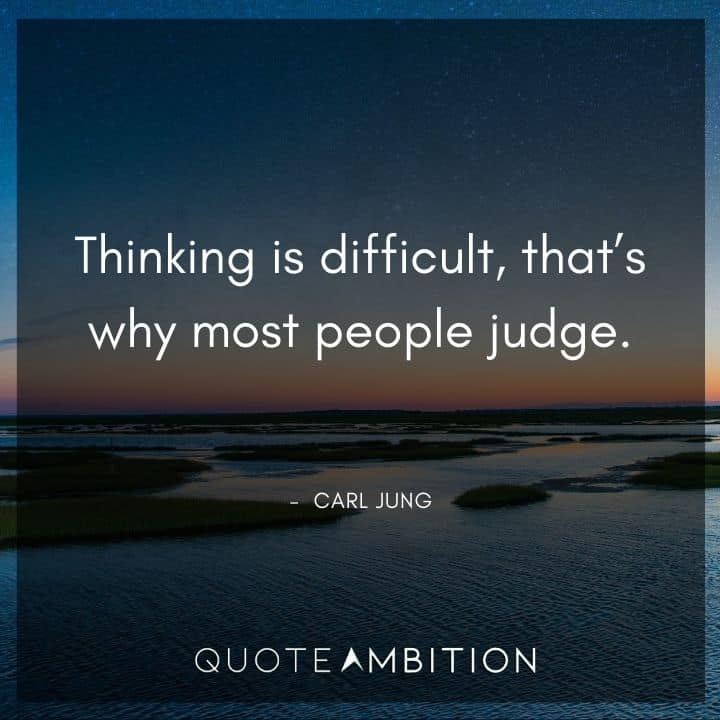
80. “Thinking is difficult, that’s why most people judge.”
81. “Where wisdom reigns, there is no conflict between thinking and feeling.”
82. “Let the light of your madness shine, and it will suddenly dawn on you.”
83. “Madness is a special form of the spirit and clings to all teachings and philosophies, but even more to daily life, since life itself is full of craziness and at bottom utterly illogical.”
84. “Man strives toward reason only so that he can make rules for himself.”
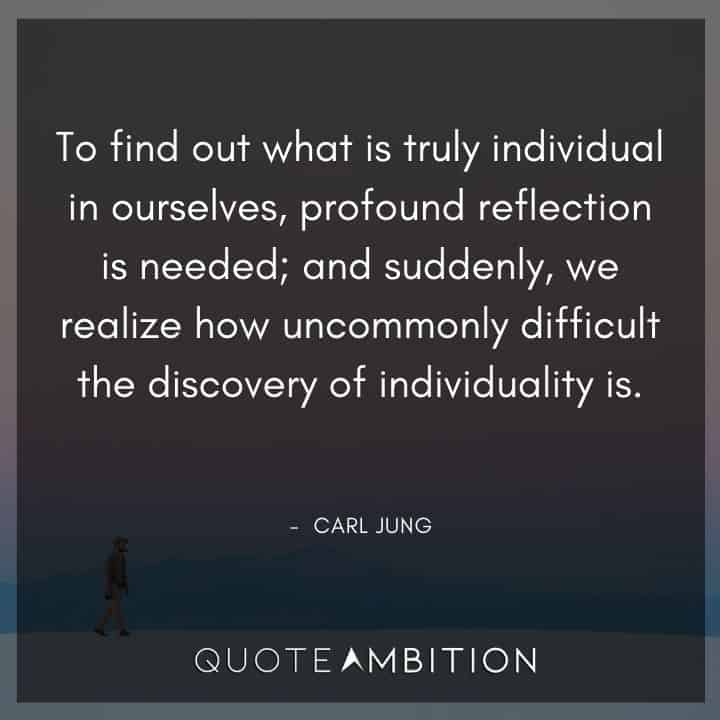
85. “To find out what is truly individual in ourselves, profound reflection is needed; and suddenly, we realize how uncommonly difficult the discovery of individuality is.”
86. “The first half of life is devoted to forming a healthy ego. The second half is going inward and letting go of it.”
87. “The curriculum is so much necessary raw material, but warmth is the vital element for the growing plant and for the soul of the child.”
88. “Nights through dreams tell the myths forgotten by the day.”
89. “We should not pretend to understand the world only by the intellect; we apprehend it just as much by feeling. Therefore, the judgment of the intellect is, at best, only the half of truth, and must, if it be honest, also come to an understanding of its inadequacy.”
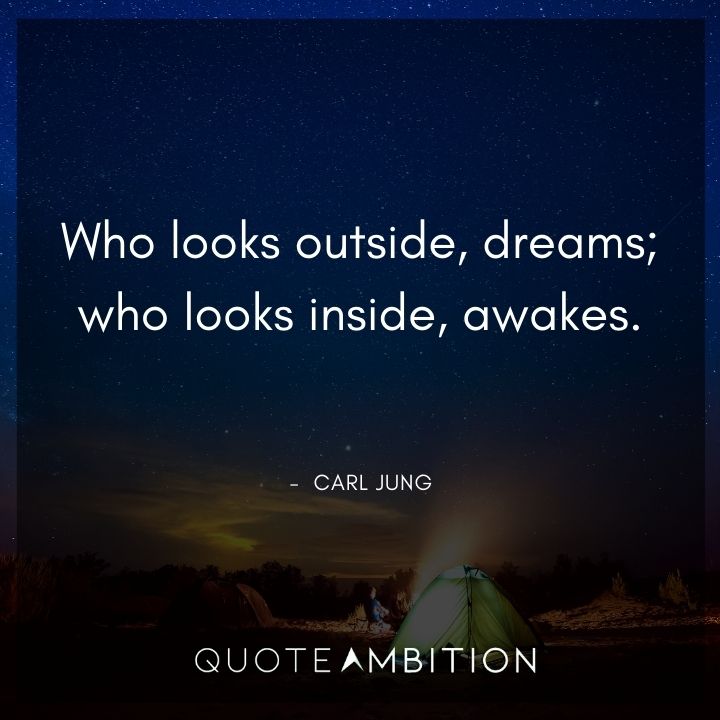
90. “Who looks outside, dreams; who looks inside, awakes.”
91. “The decisive question for man is—is he related to something infinite or not? That is the telling question of his life.”
92. “I shall not commit the fashionable stupidity of regarding everything I cannot explain as a fraud.”
93. “Words are animals, alive with a will of their own.”
94. “Without this playing with fantasy, no creative work has ever yet come to birth. The debt we owe to the play of the imagination is incalculable.”
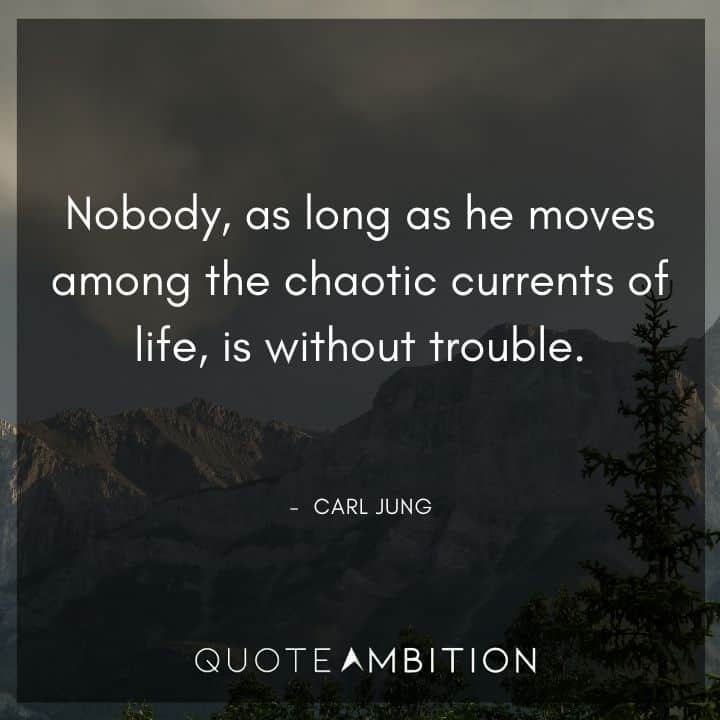
95. “Nobody, as long as he moves among the chaotic currents of life, is without trouble.”
96. “It is far better to take things as they come along with patience and equanimity.”
97. “As a human being, he may have moods and a will and personal aims; but as an artist, he is a man in a higher sense. He is a ‘collective man’—one who carries and shapes the unconscious, psychic forms of mankind.”
98. “We are born at a given moment, in a given place, and like vintage years of wine, we have the qualities of the year and of the season in which we are born.”
99. “There are not a few who are called awake by the summons of the voice, whereupon they are at once set apart from the others, feeling themselves confronted with a problem about which the others know nothing.”
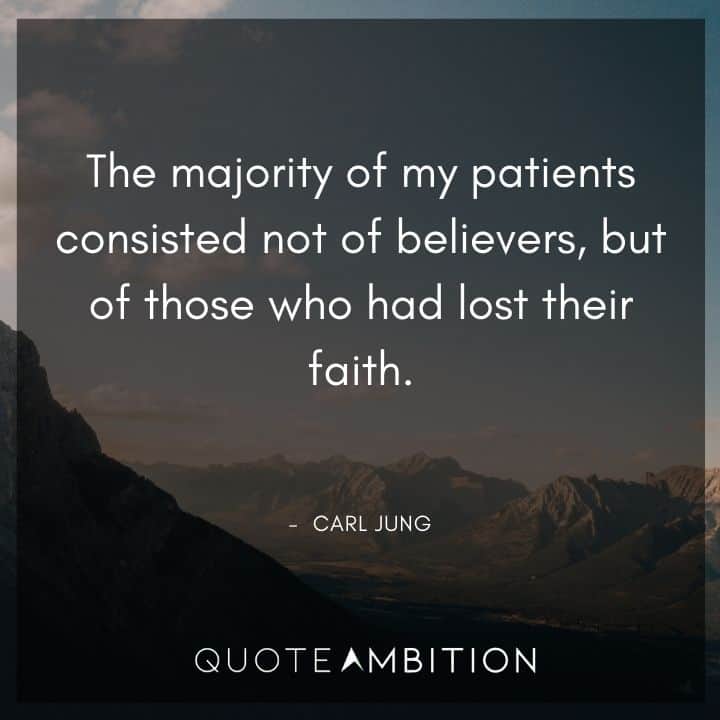
100. “The majority of my patients consisted not of believers, but of those who had lost their faith.”
101. “The gods have become our diseases.”
102. “Children are educated by what the grown-up is and not by his talk.”
103. “Life has always seemed to me like a plant that lives on its rhizome. Its true life is invisible, hidden in the rhizome.”
104. “When we think of the unending growth and decay of life and civilizations, we cannot escape the impression of absolute nullity.”
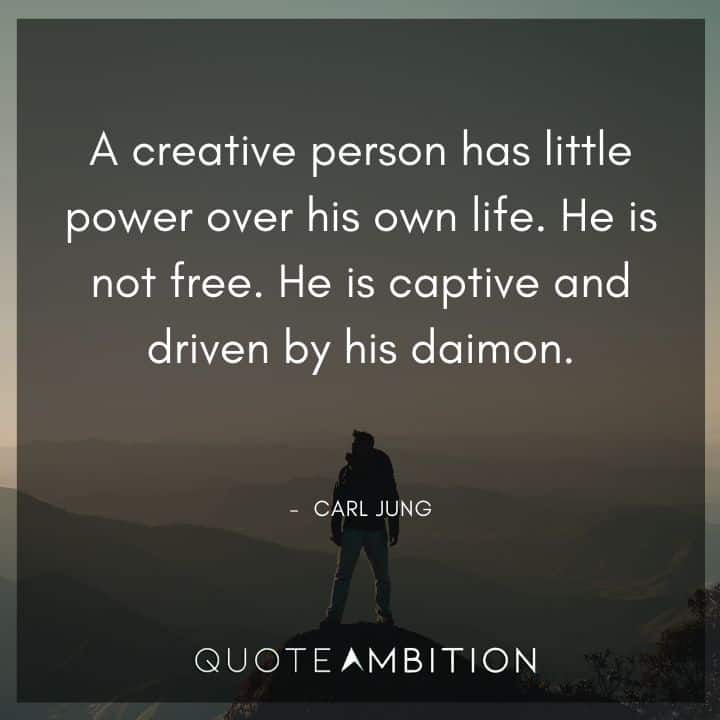
105. “A creative person has little power over his own life. He is not free. He is captive and driven by his daimon.”
106. “Neurosis is always a substitute for legitimate suffering.”
107. “We should know what our convictions are, and stand for them.”
108. “Upon one’s own philosophy—conscious or unconscious—depends one’s ultimate interpretation of facts.”
109. “As the man is, so will be his ultimate truth.”
Carl Jung Quotes on Acceptance and Strength
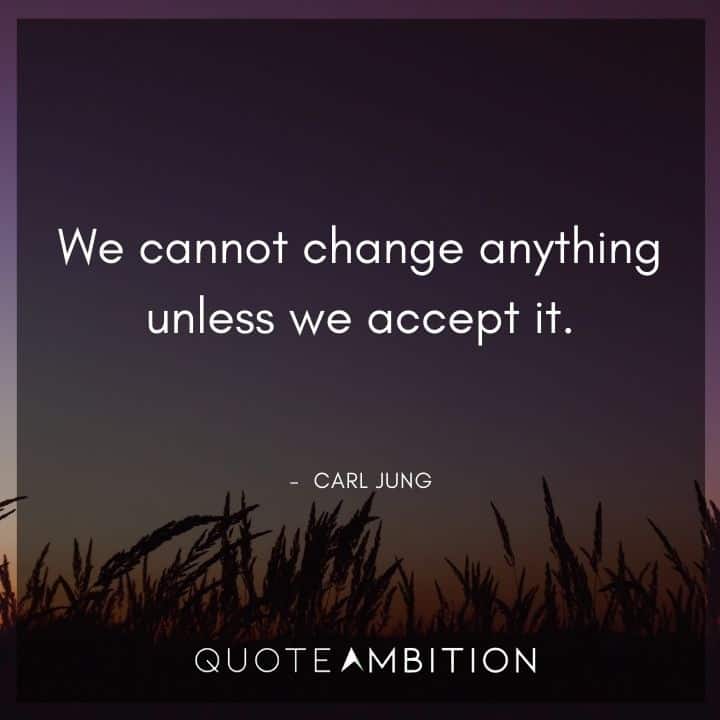
110. “We cannot change anything unless we accept it.”
111. “The acceptance of oneself is the essence of the whole moral problem and the epitome of a whole outlook on life.”
112. “You wanted to accept everything, so accept madness too.”
113. “Through pride, we are ever deceiving ourselves. But deep down below the surface of the average conscience, a still, small voice says to us, ‘Something is out of tune.’”
114. “The best political, social, and spiritual work we can do is to withdraw the projection of our shadow onto others.”
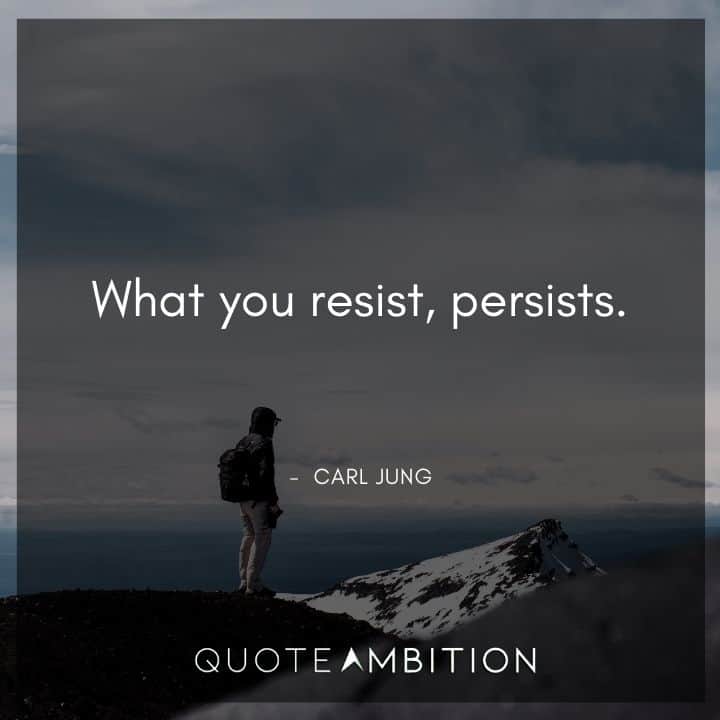
115. “What you resist, persists.”
116. “One looks back with appreciation to the brilliant teachers, but with gratitude to those who touched our human feelings.”
117. “The least of things with a meaning is worth more in life than the greatest of things without it.”
118. “Anyone who attempts to do both—to adjust to his group and at the same time pursue his individual goal—becomes neurotic.”
119. “I am astonished, disappointed, pleased with myself. I am distressed, depressed, rapturous. I am all these things at once, and cannot add up the sum.”
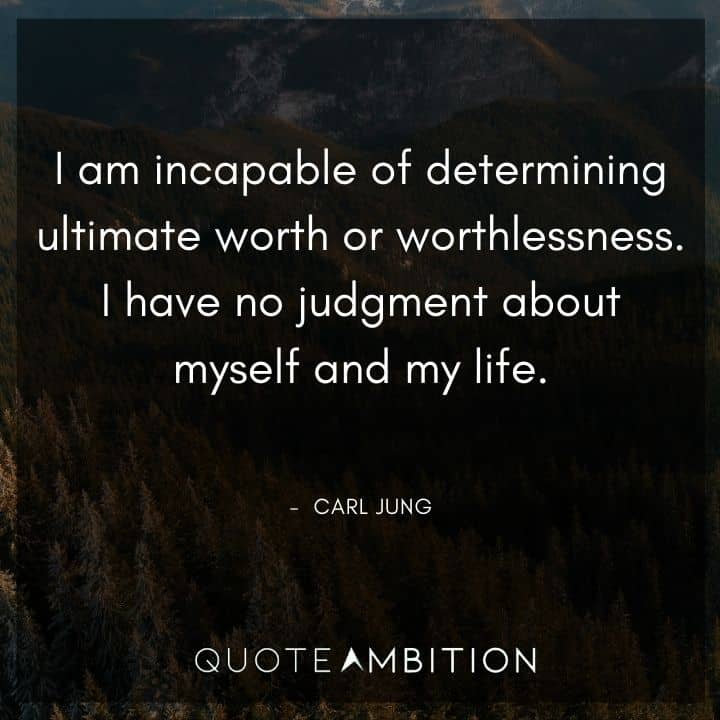
120. “I am incapable of determining ultimate worth or worthlessness. I have no judgment about myself and my life.”
121. “If one does not understand a person, one tends to regard him as a fool.”
122. “Find out what a person fears most and that is where he will develop next.”
123. “What if I should discover that the poorest of the beggars and the most impudent of offenders are all within me; and that I stand in need of the alms of my own kindness—that I, myself, am the enemy who must be loved. What then?”
124. “When an inner situation is not made conscious, it appears outside as fate.”
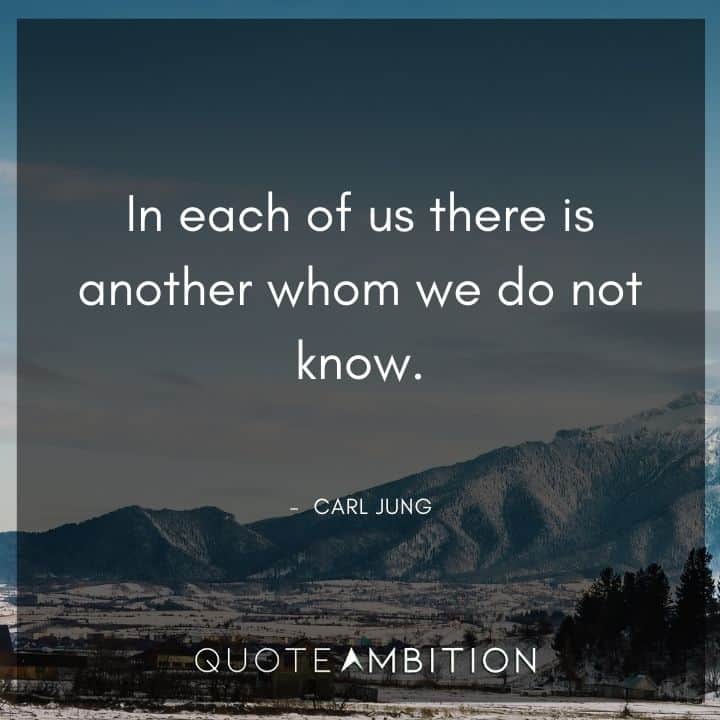
125. “In each of us there is another whom we do not know.”
126. “We are not what happened to us, we are what we wish to become.”
127. “The fact that a man who goes his own way ends in ruin means nothing. He must obey his own law, as if it were a daemon whispering to him of new and wonderful paths.”
128. “Condemnation does not liberate; it oppresses.”
129. “For better to come, good must stand aside.”
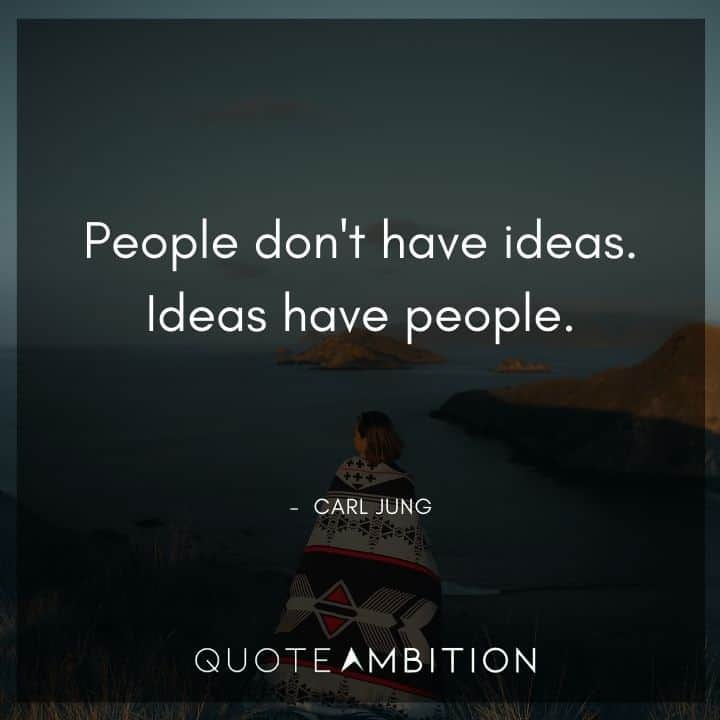
130. “People don’t have ideas. Ideas have people.”
131. “When many people gather together to share one common emotion, the total psyche emerging from the group is below the level of the individual psyche.”
132. “Creative power is mightier than its possessor.”
133. “When you are up against a wall, put down roots like a tree until clarity comes from deeper sources to see over that wall and grow.”
134. “Had I left those images hidden in the emotions, I might have been torn to pieces by them.”
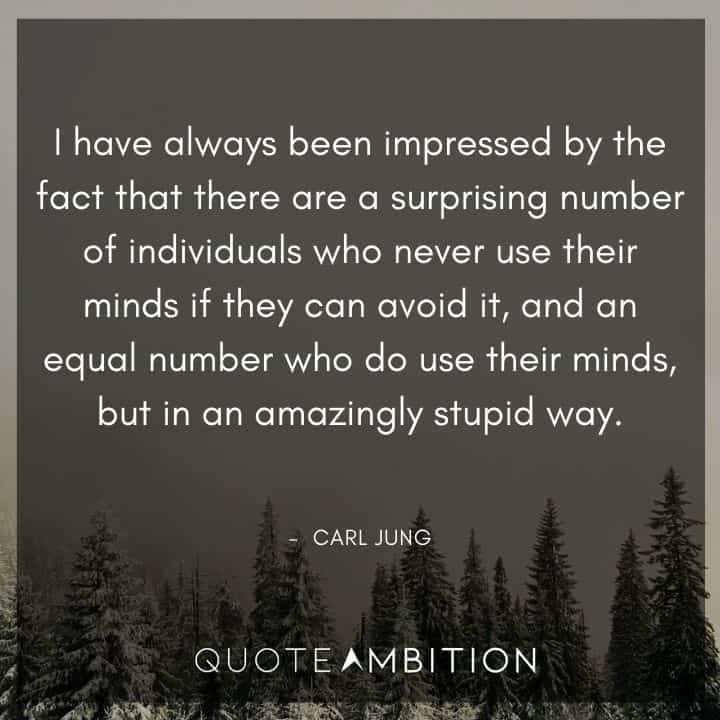
135. “I have always been impressed by the fact that there are a surprising number of individuals who never use their minds if they can avoid it, and an equal number who do use their minds, but in an amazingly stupid way.”
136. “Man cannot stand a meaningless life.”
137. “If you have nothing at all to create, then perhaps you create yourself.”
138. “The kernel of all jealousy is lack of love.”
139. “The sure path can only lead to death.”
Carl Jung Quotes on God and Religion
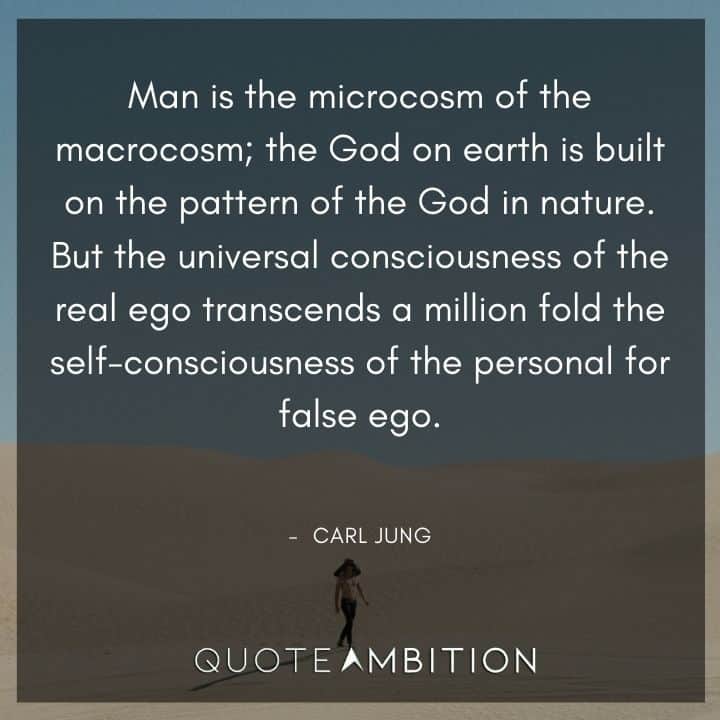
140. “Man is the microcosm of the macrocosm; the God on earth is built on the pattern of the God in nature. But the universal consciousness of the real ego transcends a million fold the self-consciousness of the personal for false ego.”
141. “Called or not, God is always there.”
142. “Man can try to name love, showering upon it all the names at his command, and still he will involve himself in endless self deceptions. If he possesses a grain of wisdom, he will lay down his arms and name the unknown by the more unknown—ignotum per ignotius—that is by the name of God.”
143. “Remember that the only God man comes in contact with is his own God, called Spirit, Soul and Mind, or Consciousness, and these three are one.”
144. “We are living in what the Greeks called the right time for a ‘metamorphosis of the gods.’”
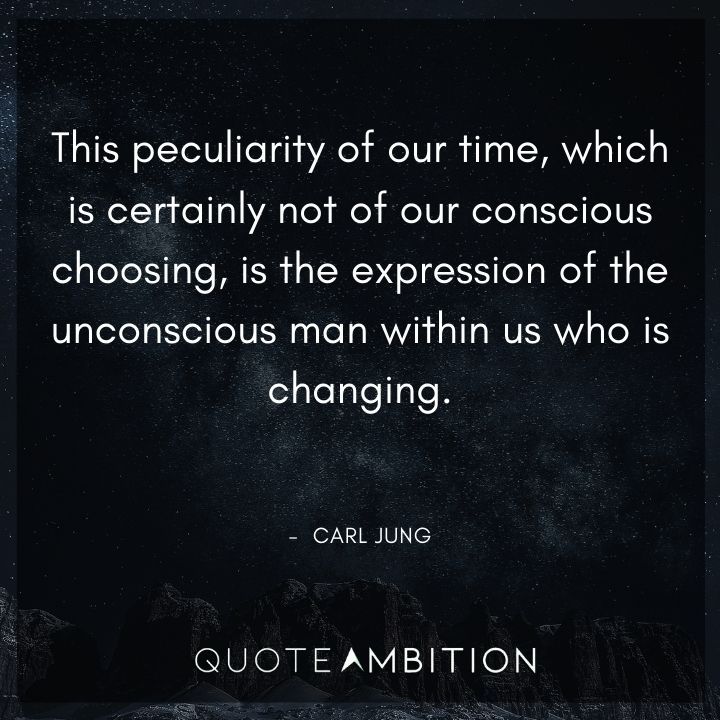
145. “This peculiarity of our time, which is certainly not of our conscious choosing, is the expression of the unconscious man within us who is changing.”
146. “Coming generations will have to take account of this momentous transformation if humanity is not to destroy itself through the might of its own technology and science.”
147. “The seat of faith, however, is not consciousness but spontaneous religious experience, which brings the individual’s faith into immediate relation with God.”
148. “Here we must ask, ‘Have I any religious experience and immediate relation to God, and hence that certainty which will keep me, as an individual, from dissolving in the crowd?’”
149. “Plants were bound for good or ill to their places. They expressed not only beauty, but also the thoughts of God’s world, with an intent of their own and without deviation.”
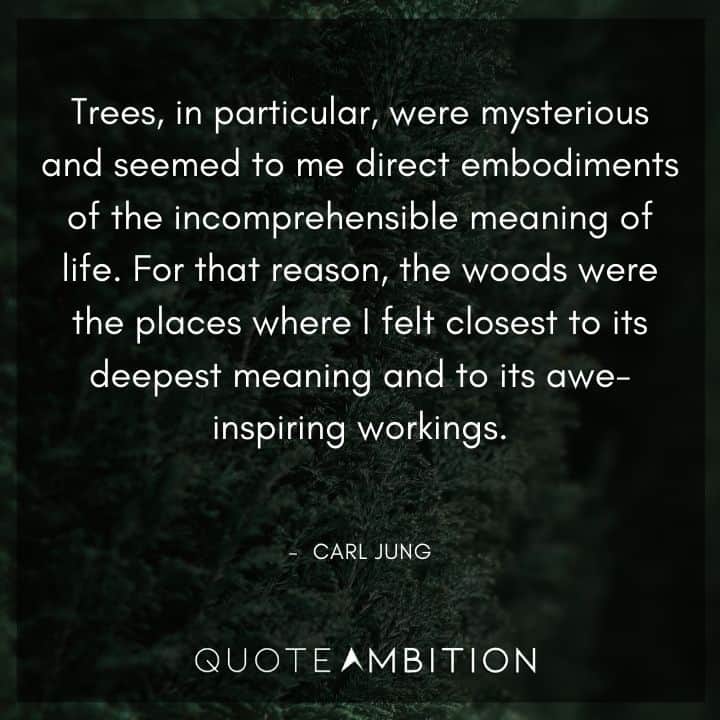
150. “Trees, in particular, were mysterious and seemed to me direct embodiments of the incomprehensible meaning of life. For that reason, the woods were the places where I felt closest to its deepest meaning and to its awe-inspiring workings.”
151. “The unconscious wants to flow into consciousness in order to reach the light, but at the same time, it continually thwarts itself because it would rather remain unconscious. That is to say, God wants to become man, but not quite.”
152. “The idea of an all-powerful divine Being is present everywhere—unconsciously if not consciously, because it is an archetype.”
153. “There is in the psyche some superior power, and if it is not consciously a god, it is the belly at least, in St. Paul’s words.”
154. “You can take away a man’s gods, but only to give him others in return.”
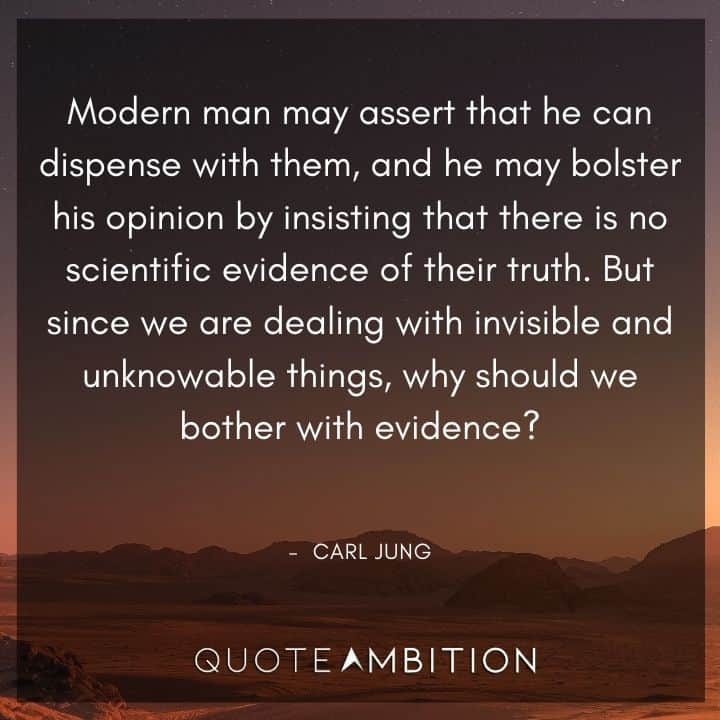
155. “Modern man may assert that he can dispense with them, and he may bolster his opinion by insisting that there is no scientific evidence of their truth. But since we are dealing with invisible and unknowable things, why should we bother with evidence?”
156. “Whether you call the principle of existence God matter, energy, or anything else you like, you have created nothing; you have merely changed a symbol.”
157. “A god is usually characteristic of a certain system of thought or morality. For instance, take the Christian God, the summum bonum—God is love, love being the highest moral principle; and God is spirit, the spirit being the supreme idea of meaning. All our Christian moral concepts derive from such assumptions, and the supreme essence of all of them is what we call God.”
158. “The world of gods and spirits is truly nothing but the collective unconscious inside me.”
159. “I find that all my thoughts circle around God like the planets around the sun, and are as irresistibly attracted to Him. I would feel it to be the grossest sin if I were to oppose any resistance to this force.”
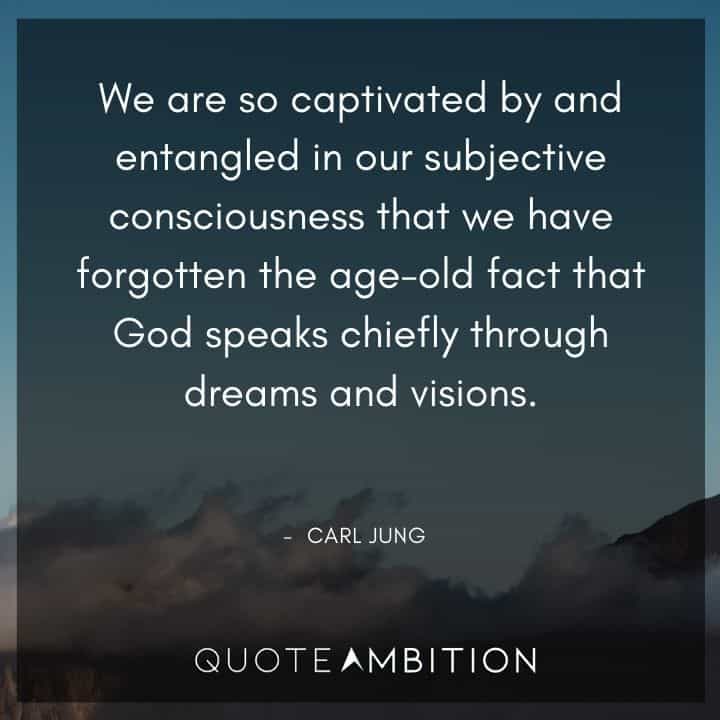
160. “We are so captivated by and entangled in our subjective consciousness that we have forgotten the age-old fact that God speaks chiefly through dreams and visions.”
Do You Believe That the Power of Your Mind Has No Limits?
It’s been more than five decades since the passing of the renowned Swiss psychologist, Carl Jung. However, his lectures and publications are still being referred to by many experts today. In his lifetime, he emphasized on the importance of exploring one’s own consciousness and unconsciousness. He believed that the power of our minds is endless, and that we can cultivate this by analyzing how our mind works, our dreams, and our fantasies. As the father of analytical psychology, Carl Jung also coined and developed the terms ‘introvert’ and ‘extrovert’.
Did this collection of quotes help you understand Carl Jung better? Were these quotes able to help you reach into your mind in order to understand yourself in a different way? Let us know what you think of Carl Jung and his theories through the comments section below.
